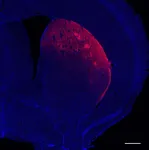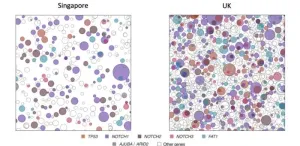(Press-News.org) CHAMPAIGN, Ill. — CAR-T immune therapies could be effective against solid tumors if the right targets are identified, a new study led by University of Illinois Urbana-Champaign researchers suggests. The researchers successfully deployed CAR-T in a mouse model of ovarian cancer, a type of aggressive, solid-tumor cancer that has eluded such therapies until now.
“Even with an advanced stage tumor model, even with a single dose, we saw strong anti-tumor effects,” said Diana Rose Ranoa, first author of the study published in the Journal of ImmunoTherapy for Cancer. Ranoa is a postdoctoral researcher at the Carl R. Woese Institute for Genomic Biology at Illinois. “There are still a lot of questions to be answered, but this study shows that CAR-T can kill this type of cancer once it recognizes the right target.”
T cells are the white blood cells in the immune system that recognize and attack specific foreign invaders to the body. CAR-T therapies use special molecular receptors, called chimeric antigen receptors, that bind to cancer biomarkers. These CARs help a patient’s own T cells target the cancer in their body as though it were an outside invader.
While such therapies are effective against blood cancers such as leukemia and lymphoma, cancers that produce solid tumors have remained difficult to treat with CAR-T immune therapies, said study leader David Kranz, a professor emeritus of biochemistry at Illinois. He also is affiliated with the Carl R. Woese Institute for Genomic Biology and with the Cancer Center at Illinois.
“There aren’t the same type of targets for these receptors on solid tumors that there are in blood cancers, and it’s very difficult to find a target that isn’t found in healthy tissues as well,” Kranz said. “The other factor is that solid tumor cells have their own way of suppressing the immune response to evade recognition by T cells and other immune cells. A lot of work is being done to try to overcome those two barriers – finding good targets and finding the right kind of CARs that could recognize those targets.”
In the new study, the researchers focused on a carbohydrate found on the surface of solid tumor cells, but not healthy cells. They developed CAR molecules with varying affinity for the molecule and tested them first in ovarian cancer cell cultures, and then in live mice with ovarian cancer tumors.
They found that the receptors with the highest affinity for the carbohydrate were highly effective at helping T cells find and destroy the cancer, shrinking or eliminating tumors after just one intravenous or injected dose – and continuing to work for months or even more than a year after the initial dose, extending the lives of the mice.
“We were surprised that the CAR-T treatment was able to do such a good job at regressing the cancer, not just because it did it for a long period of time, but because we administered the treatment at a late stage of cancer,” Kranz said. “In almost all the studies that have been done in the mouse models, you treat very early after you put the tumor in. We were treating well after that, starting at stages like where it is usually diagnosed in human patients.”
The researchers hope this and other distinctive factors of the study design may give their treatment greater potential for clinical translation to humans. While the standard for cancer trials in mice is to place human cancer cells in mice whose immune system has been compromised so that the foreign cancer will grow, the Illinois study used mice with functioning immune systems, but targeted a marker present in both mouse and human ovarian cancers.
“Setting up our model in immunocompetent mice allowed us to show how the CAR-T cells behave in the presence of an intact host immune system and to demonstrate that these CARs do not have toxic effects against healthy tissues. The treatment is very specific to the tumor,” Ranoa said. “And now we have this CAR that we’ve demonstrated can kill mouse ovarian cancer – and it has been engineered to recognize the same target in human cancers. So human studies are the logical next step for this line of research.”
The researchers plan to test their CAR-T regimen against human cancer cells cultures, as well as continue searching for other possible targets for solid-tumor cancers and the CARs that could find them.
“In this mouse model there was such a potency that it hopefully can be translated to human patients,” Kranz said. “To get something so specific against the tumor that doesn't have major side effects for the patient, that’s the holy grail.”
Editor’s notes: To reach David Kranz, email d-kranz@illinois.edu. To reach Diana Ranoa, email dranoa2@illinois.edu.
The paper “Single CAR-T cell treatment controls disseminated ovarian cancer in a syngeneic mouse model” is available online. DOI: 10.1136/jitc-2022-006509
END
CAR-T immune therapy attacks ovarian cancer in mice with a single dose
2023-08-03
ELSE PRESS RELEASES FROM THIS DATE:
GABA receptors in brain could be targets to treat depression and its cognitive symptoms
2023-08-03
CHAMPAIGN, Ill. — Depression is a complex condition correlated with multiple differences in brain function and mechanisms. A new paper spanning known data about the neurotransmitter GABA and its principal receptors showcases evidence of the receptors’ importance in depression and potential as therapeutic targets.
Based on evidence from research on the receptors’ function in the brain and the drugs that can activate or inhibit them, the authors propose possible mechanisms by which GABA-modulating treatments could ...
New clinical trial to assess canine cancer treatment
2023-08-03
DENVER/Aug. 3, 2023 – A newly funded study will evaluate the potential of a cancer drug to control tumor growth and improve outcomes for dogs with histiocytic sarcoma, an aggressive and typically fatal canine cancer.
The multi-center clinical trial is being conducted at Michigan State University, University of Florida, University of Wisconsin and Virginia Tech, and funded by the Bernese Mountain Dog Club of America through Morris Animal Foundation's Donor-Inspired Study program. Histiocytic sarcoma was ...
How sensory neurons impact the gut
2023-08-03
LA JOLLA, CA—Gastrointestinal and digestive issues impact roughly 3 million people across the United States alone, and that number is growing. A new study from Scripps Research scientists shows how sensory neurons control our gastrointestinal tracts—critical information that could shape our understanding of related diseases and disorders.
The study, published in the journal Cell on Aug. 3rd, 2023, used a combination of human clinical data and animal models to reveal that the receptor PIEZO2 controls gastrointestinal transit through the stomach, small intestine, and colon by sensing the presence of food and slowing the rate of gut motility accordingly. These ...
Study finds hallmarks of T cell exhaustion within hours of tumor exposure
2023-08-03
Immune system T cells that should be able to kill cancer cells become dysfunctional or “exhausted” within hours of encountering a tumor, according to a study reported Aug. 3 in Nature Immunology.
The surprising findings have implications for cancer immunotherapies that aim to harness the tumor-killing power of T cells, and they challenge existing ideas about how T cells become exhausted, said Mary Philip, MD, PhD, assistant professor of Medicine in the Division of Hematology and Oncology ...
New research casts doubt on role of fungus in driving pancreatic cancer
2023-08-03
DURHAM, N.C. – Four years ago, a report that a common species of fungus might fuel pancreatic cancer offered a promising new view of the deadly disease.
But in working to validate the finding, Duke Health researchers have found no such association. In a study appearing online Aug. 3 in the journal Nature, the Duke researchers conducted a multi-pronged analysis of data from the earlier study and found no link between the pancreatic microbiome and the development of pancreatic cancer.
“We were intrigued by the original finding, as were ...
Dopamine controls movement, not just rewards
2023-08-03
Dopamine: It’s not just for rewards anymore.
In a new Northwestern University-led study, researchers identified and recorded from three genetic subtypes of dopamine neurons in the midbrain region of a mouse model.
Although there is a long-standing, common assumption that most — if not all — dopamine neurons solely respond to rewards or reward-predicting cues, the researchers instead discovered that one genetic subtype fires when the body moves. And, even more surprisingly, these neurons curiously do not respond to rewards at all.
Not only ...
Study uncovers epigenetic source of resistance to targeted therapy in EGFR-mutant lung cancer
2023-08-03
RESEARCH SUMMARY
Study Title: Mammalian SWI/SNF chromatin remodeling complexes promote tyrosine kinase inhibitor resistance in EGFR-mutant lung cancer
Publication: Cancer Cell
Dana-Farber Cancer Institute Senior and Lead Authors: Cigall Kadoch, PhD; Claudia Gentile, PhD; Akshay Sankar
Study Summary:
When lung cancers driven by mutations in the EGFR gene become resistant to osimertinib or other targeted therapies, epigenetic changes, rather than genetic changes, are often to blame. In a new study in Cancer Cell, researchers at the Dana-Farber Cancer Institute and Yale Cancer Center show that the main source of these changes are ...
Past climate warming driven by hydrothermal vents
2023-08-03
About 55 million years ago, the Atlantic Ocean was born. Until then, Europe and America were connected. As the continents began to move apart, the Earth’s crust between them ruptured, releasing large volumes of magma. This rift volcanism has led to the formation of large igneous provinces (LIPs) in several places around the world. One such LIP was formed between Greenland and Europe and now lies several kilometres below the ocean surface. An international drilling campaign led by Christian Berndt from the GEOMAR ...
James Webb Space Telescope captures stunning images of the Ring Nebula
2023-08-03
NASA's James Webb Space Telescope (JWST) has recorded breath-taking new images of the iconic Ring Nebula, also known as Messier 57.
The images, released today by an international team of astronomers led by Professor Mike Barlow (UCL, UK) and Dr Nick Cox (ACRI-ST, France), with Professor Albert Zijlstra of The University of Manchester, showcase the nebula's intricate and ethereal beauty in unprecedented detail, providing scientists and the public with a mesmerizing view of this celestial wonder.
For many sky enthusiasts, the Ring Nebula is a well-known object that is visible all summer long and is located in the constellation ...
Wellcome Sanger Institute: Skin cancer-related mutations higher in the UK than Singapore
2023-08-03
SKIN CANCER-RELATED MUTATIONS HIGHER IN THE UK THAN SINGAPORE
A new study has shown how, on average, people in the UK have facial skin that is far more DNA damaged from the sun than people in Singapore, explaining the far higher risk of developing the most common skin cancers in the UK.
This study looked at keratinocyte cancers - basal and squamous cell carcinomas - rather than melanoma, a rarer and sometimes fatal form of skin cancer, finding Northern European skin types in the UK were less able to protect themselves from UV damage.
Researchers from the Wellcome Sanger Institute and their collaborators at ...




